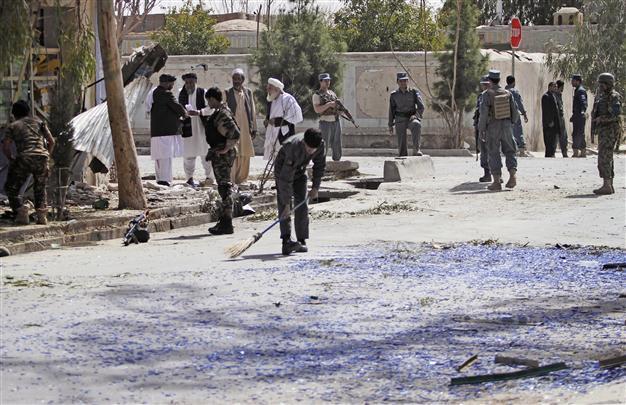Suicide bomber kills 12 in northern Afghanistan
KABUL - Agence France-Presse

A scene of a bomb explosion in Kandahar south of Kabul, Afghanistan, Wednesday, March 14, 2012. AP Photo
A suicide bomber attacked foreign military forces in northern Afghanistan on Wednesday, killing up to 12 people, officials said.The Taliban claimed responsibility for the attack on foreign troops filming interviews in a park in Maymana, the capital of Faryab province, as NATO's fatalities in the decade-long conflict passed the 100 mark for 2012.
NATO's US-led International Security Assistance Force (ISAF) said only that three service members died after an explosion in northern Afghanistan, without officially confirming that it was the same incident or giving nationalities.
"A suicide bomber targeted a group of foreign friends," Faryab governor Abdul Haq Shafaq told AFP. "They were military. There are casualties, dead and wounded." Faryab, which borders Turkmenistan, is far from centres of the Taliban-led insurgency in Afghanistan's south and east, but it suffers sporadic attacks.
There were conflicting reports about the exact death toll and the identity of the victims after the suicide bomber, who police said was riding an explosives-packed motorcycle, blew himself up.
Lal Mohammad Ahmadzai, police spokesman for northern Afghanistan, described the blast as "powerful" and put the death toll at 10. He said six civilians and four policemen were killed, with 20 people wounded, including four police.
"A suicide bomber with a suicide vest full of explosives and on a explosive-laden motorcycle targeted some foreign forces near a UN compound in Maymana," he said.
Most foreign troops in Faryab are Norwegian and Lieutenant Colonel John Espen Lien, a spokesman for Norway's armed forces, told AFP there were "at least 12 killed, but this number is not definitive".
No Norwegian ISAF personnel were nearby at the time, he added.
A doctor at the town's hospital said the bodies of five civilians had been brought in, and 26 people were wounded.
In a statement on its website the Taliban claimed responsibility for the attack, saying eight foreign soldiers were killed and six wounded, while Afghan troops also suffered casualties. The Taliban routinely exaggerate their claims.
NATO has 130,000 soldiers helping Afghan President Hamid Karzai's government fight the Taliban, but is scheduled to hand responsibility for security across the country to Afghans and withdraw most of its troops by the end of 2014.
But relations between the allies have been strained this year by a series of killings of Western troops by Afghan security personnel, a massacre of 17 civilians blamed on a US soldier and the burning of Korans at a US base.
Night raids by special forces against insurgent hideouts have also triggered popular anger and long been a source of friction with Karzai, who has denounced the NATO operations as reckless.
But US officials said Tuesday Washington and Kabul were close to an agreement giving Afghans more authority over the raids, with Afghan judges issuing warrants for the operations and Afghans in the lead on the ground.
Such a deal could remove the last obstacle to final negotiations on a long-term security agreement, which US officials hope to ink in time for a NATO summit in May in Chicago.
The Faryab attack came as the number of NATO troops killed in Afghanistan so far this year passed 100, according to an AFP count based on the independent icasualties.org website.
The war has cost the West hundreds of billions of dollars and almost 3,000 lives so far. The United States has suffered the most deaths at 1,924, according to icasualties, with Britain next on 407.
ISAF declined to confirm the total figure for 2012 so far, but according to icasualties it is slightly lower than in 2011, when 109 troops had been killed by the end of March.
ISAF spokesman Lieutenant Colonel Jimmie Cummings said that across Afghanistan, insurgent attacks fell by nine percent in 2011 and in January and February they were down 22 percent
"Every month since May 2011, there have been fewer enemy-initiated attacks than in the same period the year before," he said. "This is the longest sustained downward trend recorded by ISAF." In February, the United Nations said civilian deaths from the Afghan conflict reached a record high in 2011, when 3,021 civilians died -- mostly at the hands of insurgents -- up eight percent from 2,790 in 2010.
















